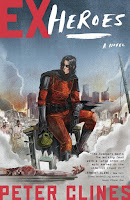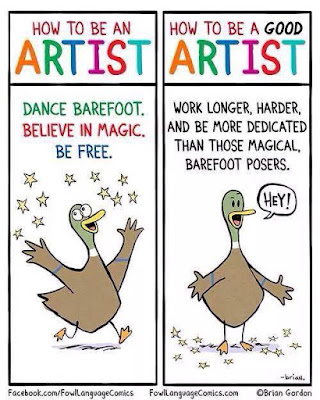Personally, I’d rewrite my cover letter after every fourth or fifth rejection. Sometimes it would be to update it with a new sale or credit. Other times I’d come up with a cleaner, slicker way to get a point across. All too often, it was to fix the typo that had slipped past three revisions and didn’t get noticed until after I sent things out. Whatever made me do it, it was rare for more than a handful of editors to get the exact same letter from me. And different people interpret those letters different ways
Category: snowflake
June 23, 2016 / 3 Comments
Rejected by Inspector #12
If I can shamelessly namedrop a bit, I heard a great Richard Matheson quote from Jonathan Maberry a while back, which I will now paraphrase as such.
Writingis the art of telling stories. Publishingis the business of selling as many copies of that art as possible.
If you break it down, this collection of rants is probably 98% about writing, maybe 2% about publishing. This week, if I may, I’d like to step away from the straight writing stuff that I normally do and touch on an issue more on the publishing side of things.
Nobody here likes getting rejected. Not for an apartment, not for a job, not for a date. Definitely not for our writing. But that’s life. Rejection happens all the time, even to the folks who get considered professionals. I had a short story rejected from an anthology last year. I’ve been trying to pitch a book trilogy to my editor for two years now, and he’s just not interested. Heck, my agent’s not even that interested in it. These things happen.
I bring this up because there’s a meme, or sometimes an article, that floats around a lot, presenting a bunch of facts that go something like this…
“Famous writer X showed their manuscript Y to twenty-three editors before someone bought it. Not only that, bestselling novel Y2 by famous writer X2 was rejected by forty-two editors. Can you imagine that? Forty-two people passed on Y2? Ha ha ha, how many of them are kicking themselves now?”
This list can be ten or fifteen authors/books long, and I see it get used a lot to show how A) I shouldn’t give up hope just because of all my rejections, B) editors don’t know anything, C) the publishing industry is a dinosaur that’s going to die out any day now, just wait and see, or D) all of the above.
So, at first glance, this list can seem like a really awesome thing. It makes me feel more positive about rejection. It makes me feel more positive about that stupid editor’s decision. It validates my feelings about big publishing and their ongoing habit of ignoring my letters. And this is good, right?
Thing is, there’s three problems here. And I think they cause more issues than all this positive affirmation solves. Y’see, Timmy, this list isn’t as clear-cut as it seems…
First problem is the false parallel that often gets drawn because of this list. Carrie was rejected many times and my early book– The Suffering Map –was rejected many times. Therefore, logically, my book must be just as good (and just as worthy of being published) as Stephen King’s breakout hit.
We can all see the flaw there, right? Just because an editor rejected a good book doesn’t mean all the books they reject are good. Some of them—let’s be honest—some of them are not good. Some of them are bad. We can all probably name one or two folks who aren’t as good at writing as they think they are. And they can probably name two or three folks, too.
I can freely admit, I’ve had books rejected by agents. And they deserved to be rejected. They were awful. Honestly, in retrospect, I’m kind of ashamed I submitted one of them.
The next problem, to be blunt, is that writers don’t always send stories where they’re supposed to go. Sometimes we get overeager or don’t do all the research we should. If I’d sent Ex-Heroes to Harlequin, of course they would’ve rejected it. So would the Black Library (a very specific niche press), Razorbill (a young adult press), or Lonely Planet (a travel book publisher). Getting rejected from these places would be completely understandable, but would it really say anything about the quality of my writing? Or that editor’s ability to recognize good writing?
So should I consider those when I say that my book’s been rejected half a dozen times?
Heck, a while back I spoke with a woman online as she lamented that her story had been rejected four times. Ignoring the fact that four times is nothing, it turned out she’d submitted to four radically different markets. She’d tried marketing it as young adult, sci-fi, fantasy, and as a horror novel. Which really meant she’d been rejected once. Once as a young adult story, once as a sci-fi story, and so on.
Is that worth calling it quits over?
Also, there are some writers out there who… well, who can’t take a hint. They’re the literary equivalent of the guy who thinks if he keeps asking Phoebe out every Friday night, eventually she’ll break down and say yes. When an editor rejects a manuscript… that’s it. Unless they specifically ask to see it again, I shouldn’t try to sneak it back in their pile six months later. No, not even if I explain that I tweaked three of the chapters. My goal is to convince them I’m a professional, and that’s not how professionals work. But some people do it anyway, often the folks who tend to do “carpet bomb” submissions of twenty or thirty editors at a time.
If Phoebe rejects my advances twenty times, is that twenty rejections? Or is it just one (and I’m really bad at taking a hint)?
So rejection numbers don’t necessarily tell a complete story.
Finally, this list implies a really big misconception, something a lot of beginners (or willfully uninformed folks) don’t get. When they hear that bestselling author Wakko Warner was rejected thirty times, they make the assumption that Wakko sent out the exact same book with the exact same query letter thirty times. Thirty editors all saw the same book that got published, letter for letter, and every one of them passed on it.
As someone who’s made those rounds, I’d be willing to bet some serious cash that’s not true.
After a given number of rejections, a good writer’s going to take note that something isn’t working. It might be a low number, just two or three. It might be as high as a dozen. But only a really deluded person is going to keep doing the exact same thing again and again and expect the results are going to radically change.
Not only that, if I was lucky enough to get any sort of feedback… I listened to it. I didn’t always follow it word for word, but if the people who were in the position to buy my stories offered suggestions, I considered them. The Suffering Mapwent through a pretty decent revision halfway through my submissions, and then another one right after I attended the SDSU Writers’ Conference.
Out of its dozen or so submissions, I’d guess at least three different versions of it went out under three or four different cover letters.
So, with all of this in mind… is it that amazing a particular book was rejected forty-two times?
It seems kind of, well, normal, doesn’t it?
It’s always fantastic to look back at the people who inspired us and how they got their start. If I want to walk that same path, though, I need to look at that start without any blinders or preconceptions. Which is going to make the path look a lot tougher.
But it’ll also make it easier to follow.
Next time…
I don’t know. Between the ranty blog and the Writers Coffeehouse, it feels like I’ve been going on and on about so many things, it all feels a bit repetitive to me. Is there an appropriate writing topic anybody’d like to hear me babble on about?
If not… I’ll put something together…
Until then, go write.
January 7, 2016 / 2 Comments
The Woooooorld of Tomorrow!
Welcome back. Glad to see you all survived the violent transition to 2016.
 I like to start the year by going over what this pile of rants is for and why I do it. I think it’s good for any of you who’ve stumbled across this page. It’s also good for me, to help stay focused on helpful tips and suggestions and, yes, the occasional rule.
I like to start the year by going over what this pile of rants is for and why I do it. I think it’s good for any of you who’ve stumbled across this page. It’s also good for me, to help stay focused on helpful tips and suggestions and, yes, the occasional rule. That’s more or less how this started, almost nine years ago now. At the time, I was writing for a screenwriting magazine, and I’d see tons of articles and websites about tricks and gimmicks—the sort of stuff you worry about after writing. I’d guess at least two-thirds of writing articles, even in our own magazine, fell into this category. Stuff like how to get an agent or manager, how to aggressively network, how to arrange book signings, that sort of thing. Most of which seemed like… well, like it was skipping a few steps.
And some of these folks were asking to be paid for their pearls of so-called wisdom.
So, I went to my editor with a few spec columns about… writing. Some basic things I’d written up based on my own years of many failures and a few successes (or, as some folks call it, experience). And the columns were rejected. A few months later I went to another editor, he passed them up the chain, and they were rejected again. Those three columns became the first posts here. I’d tossed them up just so it felt like I’d done something with them. I thought they were fairly well written and made some good points—I didn’t want them to languish on my computer. Maybe in the tiny, limited space that was the internet somebody would stumble across them and find them useful.
(Bonus fact. Maybe a year after I started posting here full time somebody pointed out Thoth-Amon was also the evil sorcerer in the Conan books and comics. Completely slipped my mind when I picked the name for the site. I just went with it because Thoth was the Egyptian god of writing)
Anyway, as I worked my way further into the life of a full-time writer, I was exposed to more and more people’s work. I read scripts for a couple different contests and got a bunch of exposure to it (reading 400+ pages a day will do that to you). And it struck me that I kept seeing the same basic mistakes. Often to wince-inducing levels.
Okay, so this is just my own experience, but at this point my experience is pretty broad so I feel good about saying it…
Most aspiring writers fall into one of two camps. Some think writing and storytelling are mechanical, quantifiable processes that can be broken down into solid rules and formulas. These are the folks who will use Syd Field as proof that their screenplay is perfect and quote the MLA Handbook to explain why their novel deserves to be published
 The other group think rules are for old-school losers who don’t get that spelling, formatting, and structure just hamper the creative process and will get overlooked when people see the inherent art in the writing. Nothing matters past the pure art of words flowing out of their fingertips. Because we all have fantastic stories to tell. Don’t know how to spell that word? That’s what spellchecker’s for. Don’t know what the word means? Well, they’ll get it from context. Not in the mood to write? Then just wait for the muse to strike. Someone said bad things about your writing? Ignore them, what do they know?! Nothing matters except being happy about your writing.
The other group think rules are for old-school losers who don’t get that spelling, formatting, and structure just hamper the creative process and will get overlooked when people see the inherent art in the writing. Nothing matters past the pure art of words flowing out of their fingertips. Because we all have fantastic stories to tell. Don’t know how to spell that word? That’s what spellchecker’s for. Don’t know what the word means? Well, they’ll get it from context. Not in the mood to write? Then just wait for the muse to strike. Someone said bad things about your writing? Ignore them, what do they know?! Nothing matters except being happy about your writing.
Both of these groups are usually wrong, for the record.
Note that I said “usually.” Most folks think it’s all-or-nothing. You have to be on one extreme or another. The truth is that it’s more of a middle ground.
Y’see, Timmy, there are correct and incorrect things in writing. I have to know how to spell (me—not my spellchecker). I have to understand grammar. I need to have a sense of pacing. If I’m writing a script, I’ve got to know the current accepted format. As a writer, I can’t ignore any of these requirements, because these are things I can get wrong and I’ll be judged on them.
On the other hand, there is no “right” way to start your writing day or to develop a character. There’s only the way that’s right for me and my story. Or you and your story. Or her and her story. This is the Golden Rule that I’ve mentioned here once or thrice. If I ask twenty different writers about their method, I’m going to get twenty different answers. And all of these answers are valid, because all of these methods work for that writer.
But that still doesn’t mean I can ignore every convention or rule I don’t like. I need to understand the rules if I want to break them successfully. Yeah, maybe there are ten or twenty people who broke the rules and succeeded… but there are hundreds of thousands, probably millions, who broke the rules and failed miserably.
And that’s what I try to do here. Talk about writing. Not the after-the-fact-stuff, just writing. I talk about rules that we need to learn and follow (until we’ve got the experience to bend or break them). I try to offer some various tips and suggestions I’ve heard over the years that may (or may not) help out when it comes to crafting a story.
I have a few topics on deck for the weeks ahead. Author visibility. Action. Inside jokes. Stakes. Motives. A few others. And if there’s something that’s been gnawing at you that you’d like me to blab about, let me know down in the comments. I’ve been doing this for a while—there aren’t many topics I haven’t had a painful learning experience with, and I’m always willing to share.
Oh, also… if you happen to live in the southern California area, I’d like to recommend the Writers Coffeehouse. It’s a monthly meeting of writers of all types and levels to talk about… well, writing. All aspects from first ideas and editing to pitching and marketing. It’s free, it’s fun, and it’s open to everyone. Jonathan Maberry (author of the Joe Ledger series, the Rot & Ruin series, and many others) brought it with him when he moved to the San Diego area, and he hosts a Coffeehouse the first Sunday of every month at the Mysterious Galaxybookstore. And starting this month, on the 24th, I’m going to be hosting one here in Los Angeles at Dark Delicacies.
So check that out if you’re in the area.
Next time, I’d like to talk about lanterns.
Until then… go write.
January 2, 2015 / 2 Comments
Syllabus
But then, in the immortal words of Doctor Emmet Brown, I figured… what the hell.
(see, clever and relevant pop culture reference…)
Anyway, I’d like to continue my tradition of starting the year by explaining the ideas behind this page and what I’m trying to accomplish here.
A better way to look at it, though, is what are you hoping to accomplish?
This is the time when we all make a lot of promises to ourselves. Resolutions, if you will. We’re going to eat better, drink less, exercise more, quit smoking, visit Europe, and maybe finally get some work done on that manuscript. Get it finished!
Now, we all know the truth behind a lot of these resolutions. Most people don’t follow through on them. In fact, gyms make a ton of money off people who sign up for a one year membership in January and then stop showing up in… February.
And we don’t think less of most of these folks when they don’t follow through. If Wakko says he wants to lose ten pounds this year and then finds out he’s getting a promotion and he’s going to be a dad, well, his priorities are going to shift a bit. We all get that and understand it. Likewise, going to Europe is something Dot always wanted to do, but there’s nothing terribly urgent about it. If it doesn’t happen this year, maybe next year.
Let’s say Yakko also wants to visit Europe, but he’s doing it as part of a career move. Being able to talk knowledgeably about Edinburgh, Paris, and Berlin can make or break his promotion chances, and he wants that promotion. This may just be a vacation for Dot, but for Yakko it’s going to affect the next twenty years of his life. They’re going to approach it in very different ways.
They should, anyway.
I’ve already seen a ton of folks making writing resolutions. To finish a screenplay or a book. Maybe two books. There were even a few daring people who wanted to get three books finished this year.
But why? Do I just want to write a screenplay because I’ve always wanted to try it? Or am I hoping this could lead to a career in the film industry? Am I writing this novel just for myself, or am I maybe looking to…well, make some money off of it? And if so, am I looking at this as a nice hobby that will pay for some LEGO models, or is this something I’m hoping will be a full career? Like a paying-all-the-bills career?
I started this page many years back because I couldn’t find any good, practical writing advice anywhere online. It was all either after-the-fact stuff about what to do with a completed manuscript or kind of vague, not-all-that-useful stuff like “read a book of poetry for inspiration, or try watercolor paints.”
A good chunk of the advice I could find that actually pertained to the act of writing was kind of… questionable. Always follow this structure. Always write at least 1000 words a day. Don’t worry about spelling or editing. Never use common words. Never use said. Name every character. It all just seemed to be either something people were pulling out of the air or repeating after it had gone through a twenty-iterations version of the telephone game.
And, as I mentioned, a lot of my own experience found this to be questionable.
So that’s what I’m trying to do here—to fill a gap for people who’d like to improve their writing and move it toward something they could actually sell to a much larger audience and maybe not just… well, a hundred people they know on Facebook.
That being said, there’ll be some harsh facts now and then. Also some very firm rules. Some folks will argue with these (some folks always do) because some of those harsh facts and ugly truths are going to go against a lot of the “special snowflake” ideas they’ve based their writing around. Others will be upset because some of the things I say might indicate they’re not quite as far along their career path as they thought. Or maybe they’re not on it at all.
I apologize in advance if this ends up being you. It’s nothing personal—it’s just the facts as I see them after about thirty-five years of trying to do this professionally. If it makes you feel better, there are very, very few screw-ups someone can make that I didn’t beat you to ages ago.
I’ll also offer up some much gentler tips and advice (some of which you may have heard before as facts or rules…). Some of these suggestions will work for you. Some won’t. Part of my job as a professional writer is to figure out what does and doesn’t work for me and to sort my tool chest accordingly. If you want to be a professional, that’s part of your job, too.
And, again, if writing’s just something you like to dabble with on weeknights because you enjoy it… cool. Maybe you’ll find some stuff here that makes it more fun for you. Or maybe you’ll just show up to laugh at those of us in the publishing rat race. That’s cool, too.
So…that’s the basic idea behind this page.
Next time, on a semi-related note, I’d like to talk to you about your choice of friends.
Until then, go write.







